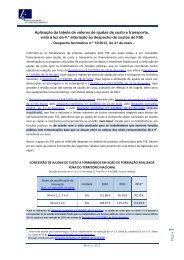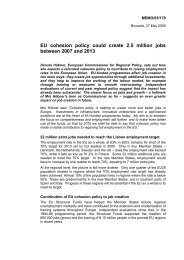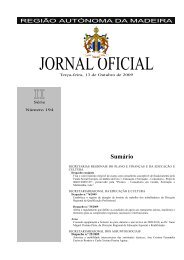Industrial Relations in Europe 2012 - European Commission - Europa
Industrial Relations in Europe 2012 - European Commission - Europa
Industrial Relations in Europe 2012 - European Commission - Europa
Create successful ePaper yourself
Turn your PDF publications into a flip-book with our unique Google optimized e-Paper software.
and moves towards fiscal consolidation. As reported <strong>in</strong> chapters 1 and 3, there are strong traditions<br />
of negotiation and consultation <strong>in</strong> the public sector, reflect<strong>in</strong>g much higher levels of union density<br />
than <strong>in</strong> the private sector. Public sector union density and <strong>in</strong>fluence is less evident <strong>in</strong> central and<br />
eastern <strong>Europe</strong>an Member States, with certa<strong>in</strong> exceptions, such as Poland (Bernaciak et al. 2011).<br />
In general, social dialogue has come under pressure. It has been challeng<strong>in</strong>g to build trust and ga<strong>in</strong><br />
agreement between parties with differ<strong>in</strong>g <strong>in</strong>terests and when austerity measures <strong>in</strong>variably <strong>in</strong>volve<br />
mak<strong>in</strong>g concessions that the social partners may not be will<strong>in</strong>g or able to concede.<br />
At the same time the contentious nature of austerity measures makes negotiation and consultation<br />
even more important because austerity measures cannot be implemented effectively without some<br />
level of acceptance and ownership by the social partners. This is particularly true <strong>in</strong> the case of<br />
policies with longer-term implications such as pensions – see chapter 6 of this report. Social<br />
dialogue provides opportunities for the social partners to share <strong>in</strong>formation with each other, enables<br />
government to improve policy design and implementation, and often ensures the most vulnerable<br />
are shielded from the consequences of austerity measures. Nonetheless, <strong>in</strong> many countries a sense<br />
of ownership has been absent and the implementation of austerity measures has resulted <strong>in</strong> severe<br />
social strife. Despite these stra<strong>in</strong>s, <strong>in</strong> some countries traditions of negotiation and consultation have<br />
rema<strong>in</strong>ed <strong>in</strong>tact, facilitat<strong>in</strong>g more effective implementation and reduced conflict.<br />
Public services social dialogue occurs at a number of levels. At <strong>Europe</strong>an level, the response of the<br />
sectoral level committees to the crisis is documented <strong>in</strong> box 4.2.<br />
Box 4.2 EU level public services sectoral social dialogue jo<strong>in</strong>t statements on the crisis<br />
There are four <strong>Europe</strong>an sectoral social dialogue committees which cover the public sector. The<br />
committee for local and regional government comprises the <strong>Europe</strong>an Federation of Public Service<br />
Unions (EPSU) and the Council of <strong>Europe</strong>an Municipalities and Regions (CEMR). In education,<br />
the social partners are the <strong>Europe</strong>an Trade Unions Committee for Education (ETUCE) and the<br />
<strong>Europe</strong>an Federation of Education Employers (EFEE). For hospitals, EPSU meets with the<br />
<strong>Europe</strong>an Hospital and Healthcare Employers’ Association (HOSPEEM) and <strong>in</strong> central government<br />
the Trade Unions’ National and <strong>Europe</strong>an Adm<strong>in</strong>istration Delegation (TUNED) is l<strong>in</strong>ked with the<br />
<strong>Europe</strong>an Union Public Adm<strong>in</strong>istration Employers).<br />
The local and regional government social partners (CEMR and EPSU) sent a jo<strong>in</strong>t message to the<br />
<strong>Europe</strong>an Council meet<strong>in</strong>g <strong>in</strong> March 2009, emphasis<strong>in</strong>g the importance of ma<strong>in</strong>ta<strong>in</strong><strong>in</strong>g employment<br />
<strong>in</strong> the sector and the resource implications of <strong>in</strong>creased demand for services. Further jo<strong>in</strong>t<br />
statements were issued on the economic crisis, re<strong>in</strong>forc<strong>in</strong>g these po<strong>in</strong>ts, to a <strong>Europe</strong>an Council<br />
meet<strong>in</strong>g <strong>in</strong> February 2010 and December 2010.<br />
In October 2011, CEMR and EPSU rem<strong>in</strong>ded the <strong>Europe</strong>an Council ahead of its 26 October<br />
meet<strong>in</strong>g that: ‘the austerity policy followed by dramatic cuts <strong>in</strong> public services….will cont<strong>in</strong>ue to<br />
underm<strong>in</strong>e labour markets and the social model.’ The jo<strong>in</strong>t statement encouraged the <strong>Europe</strong>an<br />
Council to take a long-term perspective to strengthen and enhance social dialogue <strong>in</strong>clud<strong>in</strong>g support<br />
for ‘susta<strong>in</strong>able employment measures <strong>in</strong> Local and Regional Government and <strong>in</strong>vestment <strong>in</strong><br />
tra<strong>in</strong><strong>in</strong>g, skills and decent work’.<br />
The central government adm<strong>in</strong>istrations social partners (TUNED and EUPAN) issued a statement<br />
on 31 December 2011 and noted that ‘<strong>in</strong> a majority of <strong>Europe</strong>an Countries the adm<strong>in</strong>istrations are<br />
183

















